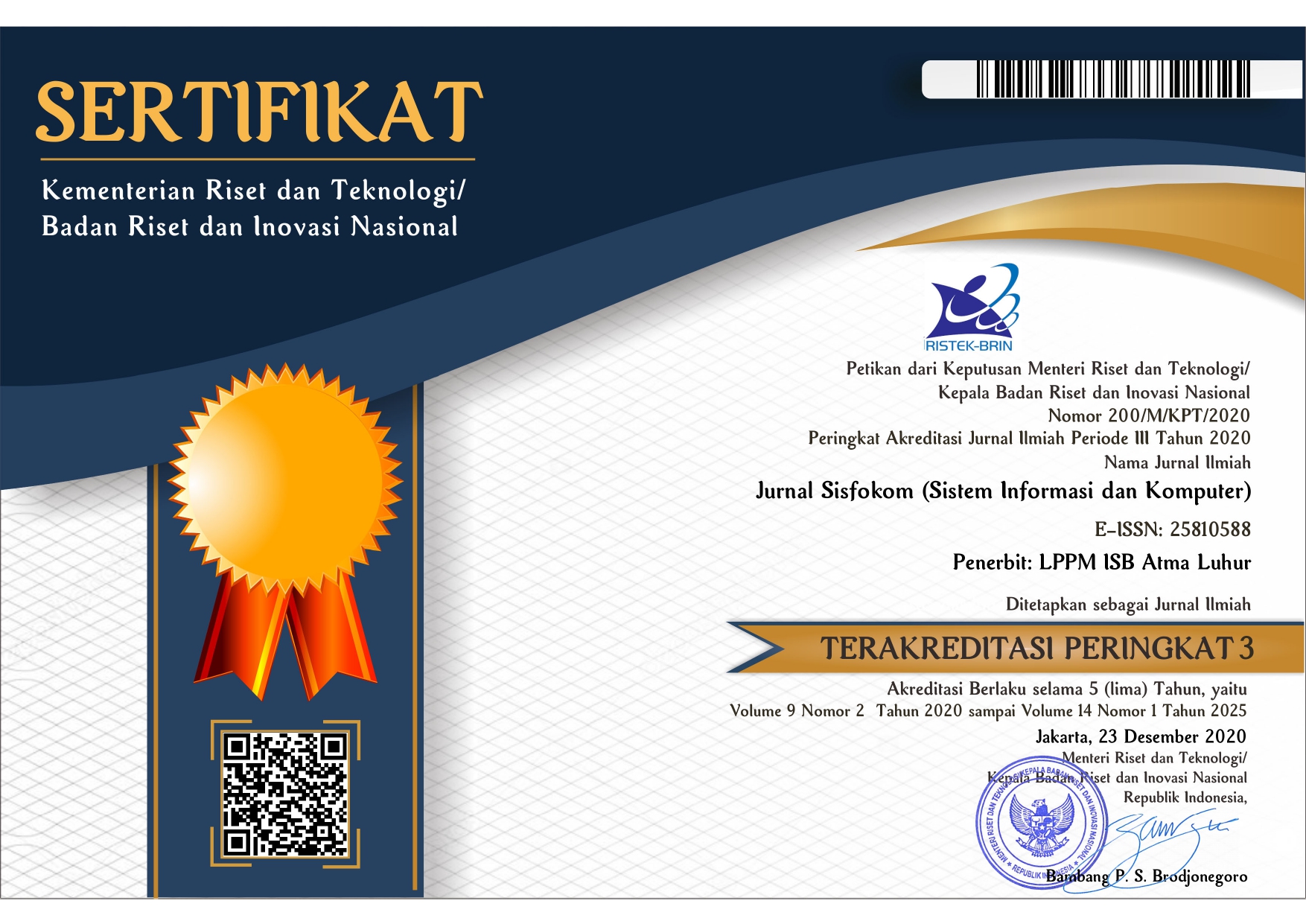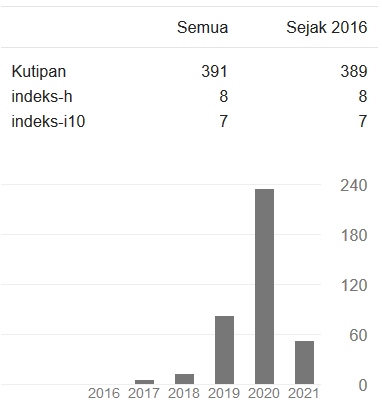Analysis of Determinants of Satisfaction Using E-Learning in Elementary School Students
DOI:
https://doi.org/10.32736/sisfokom.v12i2.1620Keywords:
User Satisfaction, e-learning, covid19, elementary studentAbstract
The COVID-19 pandemic, a global health crisis, has made many sectors carry out their activities in new ways, including the education sector. Teaching and learning activities should not be conducted face-to-face during the COVID-19 pandemic. As a result, all learning activities are diverted through e-learning. Therefore, an evaluation of the use of e-learning needs to be carried out to ensure its practical use and a positive impact. This study evaluates the factors that affect the satisfaction of e-learning users. Data were collected by surveying 205 elementary school students in the 4th, 5th, and 6th grades, then analyzed using the structural equation model technique. The results showed that Technical System Quality, Information Quality, Learner Quality, and Perceived Usefulness affected the satisfaction of e-learning users. These results can be suggestions for schools to fix and improve e-learning performance so that students and teachers no longer have difficulties when an event requires online teaching and learning activities.References
“Moodle - Open-source learning platform | Moodle.org.” https://moodle.org/?lang=id (accessed Sep. 01, 2022).
“Edmodo.” https://new.edmodo.com/ (accessed Sep. 01, 2022).
“Schoology Learning | PowerSchool.” https://www.powerschool.com/solutions/unified-classroom/schoology-learning/ (accessed Sep. 01, 2022).
“Classroom.” https://classroom.google.com/ (accessed Sep. 01, 2022).
I. Maslov, S. Nikou, and P. Hansen, “Exploring user experience of learning management system,” Int. J. Inf. Learn. Technol., vol. 38, no. 4, pp. 344–363, Jan. 2021, doi: 10.1108/IJILT-03-2021-0046.
S. Nikou and I. Maslov, “An analysis of students’ perspectives on e-learning participation – the case of COVID-19 pandemic,” Int. J. Inf. Learn. Technol., vol. 38, no. 3, pp. 299–315, Jan. 2021, doi: 10.1108/IJILT-12-2020-0220.
S. Nikou and I. Maslov, “Finnish university students’ satisfaction with e-learning outcomes during the COVID-19 pandemic,” Int. J. Educ. Manag., vol. ahead-of-print, no. ahead-of-print, Jan. 2022, doi: 10.1108/IJEM-04-2022-0166.
R. Ó. Martín, F. González-Gómez, and J. Guardiola, “Do course evaluation systems have an influence on e-learning student satisfaction?,” High. Educ. Eval. Dev., vol. 13, no. 1, pp. 18–32, Jan. 2019, doi: 10.1108/HEED-09-2018-0022.
Herman, Y. Lutfia, M. Y. Harahap, M. R. Maizan, F. William, and Siswono, “Analysis of End User Satisfaction Level of ‘MyTelkomsel’ Services in Indonesia using End User Computer Satisfaction Approach,” in 2020 International Conference on Information Management and Technology (ICIMTech), Bandung, Indonesia: IEEE, Aug. 2020, pp. 493–497. doi: 10.1109/ICIMTech50083.2020.9211264.
B. Hadji and P. Degoulet, “Information system end-user satisfaction and continuance intention: A unified modeling approach,” J. Biomed. Inform., vol. 61, pp. 185–193, Jun. 2016, doi: 10.1016/j.jbi.2016.03.021.
N. A. Hidayah, E. Rustamaji, and Purusotama, “Determining User Satisfaction Factors on University Tuition Fee Systems Using End-User Computing Satisfaction (EUCS),” in 2018 6th International Conference on Cyber and IT Service Management (CITSM), Parapat, Indonesia: IEEE, Aug. 2018, pp. 1–5. doi: 10.1109/CITSM.2018.8674378.
B. Prasetyo, R. W. E. Yulia, and Felisia, “Measuring end-user satisfaction of online marketplace using end-user computing satisfaction model (EUCS Model) (Case study: Tokopedia.com),” in 2017 4th International Conference on Computer Applications and Information Processing Technology (CAIPT), Kuta Bali: IEEE, Aug. 2017, pp. 1–5. doi: 10.1109/CAIPT.2017.8320710.
E. W. A. Mawaddah, B. Prasetyo, and B. R. P. Darnoto, “Evaluate User Satisfaction DANA as Cashless Platform to Support Financial Technology Using End User Computing Satisfaction Method,” in 2019 International Conference on Computer Science, Information Technology, and Electrical Engineering (ICOMITEE), Jember, Indonesia: IEEE, Oct. 2019, pp. 139–142. doi: 10.1109/ICOMITEE.2019.8920942.
V. P. Aggelidis and P. D. Chatzoglou, “Hospital information systems: Measuring end user computing satisfaction (EUCS),” J. Biomed. Inform., vol. 45, no. 3, pp. 566–579, Jun. 2012, doi: 10.1016/j.jbi.2012.02.009.
D. Al-Fraihat, M. Joy, R. Masa’deh, and J. Sinclair, “Evaluating E-learning systems success: An empirical study,” Comput. Hum. Behav., vol. 102, pp. 67–86, Jan. 2020, doi: 10.1016/j.chb.2019.08.004.
D. Prayudi and R. Oktapiani, “PENGUKURAN KUALITAS SISTEM INFORMASI PENDAFTARAN PASIEN DENGAN MODEL DELONE MCLEAN (Studi Kasus pada Aplikasi Mobile RS Hermina),” vol. 9, no. 1, 2020.
R. Rachman, “Analisa Kesuksesan E-Government LAPOR dengan Model Delone-Mclean pada Pengembangan Smart City,” J. Sist. Inf., vol. 10.
W. Nicola, T. L. M. Suryanto, and A. Faroqi, “DeLone and McLean
Sebagai Model Pengukuran Layanan Informasi Tanggap Covid-19,” Jutisi J. Ilm. Tek. Inform. Dan Sist. Inf., vol. 11, no. 2, p. 371, Jul. 2022, doi: 10.35889/jutisi.v11i2.838.
W. H. DeLone and E. R. McLean, “Information Systems Success Measurement,” Found. Trends® Inf. Syst., vol. 2, no. 1, pp. 1–116, 2016, doi: 10.1561/2900000005.
S. Laumer, C. Maier, and T. Weitzel, “Information quality, user satisfaction, and the manifestation of workarounds: a qualitative and quantitative study of enterprise content management system users,” Eur. J. Inf. Syst., vol. 26, no. 4, pp. 333–360, Jul. 2017, doi: 10.1057/s41303-016-0029-7.
T. Koivumäki, A. Ristola, and M. Kesti, “The effects of information quality of mobile information services on user satisfaction and service acceptance–empirical evidence from Finland,” Behav. Inf. Technol., vol. 27, no. 5, pp. 375–385, Sep. 2008, doi: 10.1080/01449290601177003.
A. A. Syahidah and M. F. Aransyah, “Pengaruh E-Service Quality dan E-Trust Terhadap E-Customer Loyalty Pada Pengguna Dompet Digital DANA Melalui E-Satisfaction Sebagai Variabel Intervening,” J. Sisfokom Sist. Inf. Dan Komput., vol. 12, no. 1, pp. 36–44, Mar. 2023, doi: 10.32736/sisfokom.v12i1.1593.
I. S. Wijaya, D. Sandra, K. Khairuldi, E. A. Winanto, and S. Sharipuddin, “Tingkat Kesuksesan E-Learning Edmodo Sebagai Sistem Pembelajaran Online Selama Pandemi Covid 19 Adopsi Model DeLone&Mclean,” J. Sisfokom Sist. Inf. Dan Komput., vol. 11, no. 3, pp. 297–303, Dec. 2022, doi: 10.32736/sisfokom.v11i3.1333.
Y. Sriyeni, D. Antoni, and M. Akbar, “Analisis Penerimaan dan Penggunaan Teknologi Computer Based Test (CBT) sebagai Media Ujian Online dengan Model Uified Theory of Acceptance And Use of Technology (UTAUT),” Teknomatika, vol. 08, no. 01, pp. 93–104, 2018.
D. Napitupulu, “Kajian Penerimaan e-Learning dengan Pendekatan TAM,” INA-Rxiv, preprint, Oct. 2017. doi: 10.31227/osf.io/6euqp.
M. Sholihin and D. Ratmono, Analisis SEM-PLS dengan WarpPLS 7.0 untuk hubungan nonlinier dalam penelitian sosial dan bisnis. Yogyakarta: Penerbit ANDI, 2021.
E. M. Safitri, A. Pratama, M. A. Furqon, I. R. Mukhlis, Agussalim, and A. Faroqi, “Interaction effect of system, information and service quality on intention to use and user satisfaction,” in Proceeding - 6th Information Technology International Seminar, ITIS 2020, 2020, pp. 92–97. doi: 10.1109/ITIS50118.2020.9321002.
C. Chang, “Exploring the determinants of e‐learning systems continuance intention in academic libraries,” Libr. Manag., vol. 34, no. 1/2, pp. 40–55, Jan. 2013, doi: 10.1108/01435121311298261.
A. Yeung, “The Role of User Satisfaction Management in Mobile Healthcare,” in 2020 IEEE 2nd International Workshop on System Biology and Biomedical Systems (SBBS), Taichung, Taiwan: IEEE, Dec. 2020, pp. 1–4. doi: 10.1109/SBBS50483.2020.9314937.
P. Zhou, R. He, D. Zhang, and J. Rao, “Exploring Factors Affecting Students’ Satisfaction of M-Learning in High School,” in 2018 Seventh International Conference of Educational Innovation through Technology (EITT), Auckland, New Zealand: IEEE, Dec. 2018, pp. 144–149. doi: 10.1109/EITT.2018.00036.
Y. Alami and I. I. El, “Students’ adoption of e-learning: evidence from a Moroccan business school in the COVID-19 era,” Arab Gulf J. Sci. Res., vol. 40, no. 1, pp. 54–78, Jan. 2022, doi: 10.1108/AGJSR-05-2022-0052.
Downloads
Published
Issue
Section
License
The copyright of the article that accepted for publication shall be assigned to Jurnal Sisfokom (Sistem Informasi dan Komputer) and LPPM ISB Atma Luhur as the publisher of the journal. Copyright includes the right to reproduce and deliver the article in all form and media, including reprints, photographs, microfilms, and any other similar reproductions, as well as translations.
Jurnal Sisfokom (Sistem Informasi dan Komputer), LPPM ISB Atma Luhur, and the Editors make every effort to ensure that no wrong or misleading data, opinions or statements be published in the journal. In any way, the contents of the articles and advertisements published in Jurnal Sisfokom (Sistem Informasi dan Komputer) are the sole and exclusive responsibility of their respective authors.
Jurnal Sisfokom (Sistem Informasi dan Komputer) has full publishing rights to the published articles. Authors are allowed to distribute articles that have been published by sharing the link or DOI of the article. Authors are allowed to use their articles for legal purposes deemed necessary without the written permission of the journal with the initial publication notification from the Jurnal Sisfokom (Sistem Informasi dan Komputer).
The Copyright Transfer Form can be downloaded [Copyright Transfer Form Jurnal Sisfokom (Sistem Informasi dan Komputer).
This agreement is to be signed by at least one of the authors who have obtained the assent of the co-author(s). After submission of this agreement signed by the corresponding author, changes of authorship or in the order of the authors listed will not be accepted. The copyright form should be signed originally, and send it to the Editorial in the form of scanned document to sisfokom@atmaluhur.ac.id.









